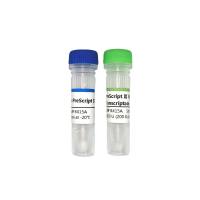Drug resistance is a major factor that limits the effectiveness of cancer chemotherapy, and there is considerable evidence to suggest a genetic basis for many drug-resistant phenotypes. A major drawback to many of the conventional approaches used to investigate drug-resistance mechanisms is that some prior information or guesswork on the changes that have occurred is required, thus necessitating separate reagents to screen each possible change. When analyzing genetic changes for example, screening is limited to the use of gene or region specific probes as in Southern blot or microsatellite analysis. Recently, the molecular cytogenetic techniques of reverse in situ hybridization (REVISH), and its more advanced relative, comparative genomic hybridization (CGH), have been developed for the rapid global detection and mapping of genetic imbalances in tumor genomes (1 –7 ). In REVISH, genomic DNA from the tumor is used as a complex probe and hybridized to normal metaphase chromosomes (6 ). Genomic sequences amplified in the tumor are then detected as an increased intensity of signal at the normal chromosomal position from which the amplified sequences are derived (1 ,6 ,7 ). For more accurate analysis of both loss and gain of genetic material, CGH is required; however, CGH involves complex fluorescence-comparison techniques and expert knowledge of chromosome identification (2 ). However, both REVISH and CGH are ideal methods to detect genetic changes associated with the acquisition of drug resistance in tumors (6 ,8 ).



![四[N-邻苯二甲酰-(S)-叔亮氨酸基]二铑双(乙酸乙酯)加合物;154090-43-4;Elemental analysis(Nitrogen) 3.30 to 4.50 %;V66234-25mg](https://img1.dxycdn.com/p/s14/2025/1029/004/8672158669127143891.jpg!wh200)


